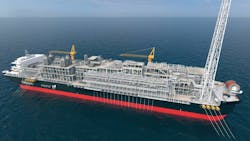OTC 2021: Equinor official highlights ‘flagship’ Brazilian pre-salt project
Offshore staff
HOUSTON – Veronica Coelho, Equinor’s country manager in Brazil, discussed the Bacalhau project during the Brazilian Pre-Salt Development panel at the Offshore Technology Conference on Tuesday.
On June 1, 2021, Equinor and its partner ExxonMobil, Petrogal Brasil, and Pré-sal Petróleo SA sanctioned the $8-billion Bacalhau project in the pre-salt Santos basin. This is the first greenfield development by an international operator in the pre-salt.
According to Coelho, “Bacalhau is a true flagship. It is competitive on all measures.” She noted the breakeven is less than 35/bbl; payback is expected in four years; and the lifetime average CO2 intensity is anticipated to be less than 9 kg/bbl produced, about half the current industry average.
“The presalt with high volumes and high producibility of wells is undoubtedly one of the most attractive areas to develop oil and gas resources in the world,” she said.
Bacalhau is 185 km (115 mi) offshore São Paulo, in water depths of 2,050 m (6,725 ft). The field extends across two licenses, BM-S-8 and Norte de Carcará.
The development will consist of 19 subsea wells tied back to the largest FPSO in Brazil. MODEC is constructing the FPSO with a 220,000 b/d of oil processing capacity.
While the FPSO will be the first application of MODEC’s M350 full double-hull design, it will also feature a combined cycle gas turbine system. This novel technology is expected to reduce CO2 emissions by about 25%, she said.
First oil is expected in 2024.
She said the company engaged with key suppliers early to “ensure strong collaboration throughout the engineering phase.”
Equinor is leveraging its experience and technologies from the Norwegian continental shelf to maximize production throughout the lifetime of the Bacalhau field, Coelho said. She noted an integrated operations center will enable real-time data to improve production and energy efficiency and reduce emissions. Condition-based maintenance using machine learning and artificial intelligence will optimize uptime of the equipment. Automated drilling control will increase efficiency and reduce risk and cost.
08/17/2021
